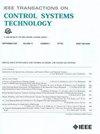基于学习障碍不确定性的鲁棒预测运动规划
IF 3.9
2区 计算机科学
Q1 AUTOMATION & CONTROL SYSTEMS
引用次数: 0
摘要
在不确定障碍物存在的情况下,机器人系统在动态环境中的安全运动规划是非常重要的,其中障碍物不确定性的估计对于预测动态障碍物的未来运动至关重要。最坏情况的描述给出了保守的不确定性预测,可能导致自我机器人系统的运动规划不可行。本文通过对障碍物不确定性的在线学习,提出了一种高效、鲁棒、安全的运动规划算法。更具体地说,通过求解线性规划(LP)问题,有效地计算未知但预期的障碍物控制集。学习控制集用于计算比最坏情况预测更保守的障碍物前向可达集(FRSs)。在前向预测的基础上,设计了鲁棒模型预测控制器,为自我机器人系统计算安全参考轨迹,使其在预测范围内保持在可到达的障碍集之外。通过仿真和硬件实验,验证了该方法的有效性。本文章由计算机程序翻译,如有差异,请以英文原文为准。
Robust Predictive Motion Planning by Learning Obstacle Uncertainty
Safe motion planning for robotic systems in dynamic environments is nontrivial in the presence of uncertain obstacles, where estimation of obstacle uncertainties is crucial in predicting future motions of dynamic obstacles. The worst case characterization gives a conservative uncertainty prediction and may result in infeasible motion planning for the ego robotic system. In this article, an efficient, robust, and safe motion-planning algorithm is developed by learning the obstacle uncertainties online. More specifically, the unknown yet intended control set of obstacles is efficiently computed by solving a linear programming (LP) problem. The learned control set is used to compute forward reachable sets (FRSs) of obstacles that are less conservative than the worst case prediction. Based on the forward prediction, a robust model predictive controller is designed to compute a safe reference trajectory for the ego robotic system that remains outside the reachable sets of obstacles over the prediction horizon. The method is applied to a car-like mobile robot in both simulations and hardware experiments to demonstrate its effectiveness.
求助全文
通过发布文献求助,成功后即可免费获取论文全文。
去求助
来源期刊

IEEE Transactions on Control Systems Technology
工程技术-工程:电子与电气
CiteScore
10.70
自引率
2.10%
发文量
218
审稿时长
6.7 months
期刊介绍:
The IEEE Transactions on Control Systems Technology publishes high quality technical papers on technological advances in control engineering. The word technology is from the Greek technologia. The modern meaning is a scientific method to achieve a practical purpose. Control Systems Technology includes all aspects of control engineering needed to implement practical control systems, from analysis and design, through simulation and hardware. A primary purpose of the IEEE Transactions on Control Systems Technology is to have an archival publication which will bridge the gap between theory and practice. Papers are published in the IEEE Transactions on Control System Technology which disclose significant new knowledge, exploratory developments, or practical applications in all aspects of technology needed to implement control systems, from analysis and design through simulation, and hardware.
 求助内容:
求助内容: 应助结果提醒方式:
应助结果提醒方式:


